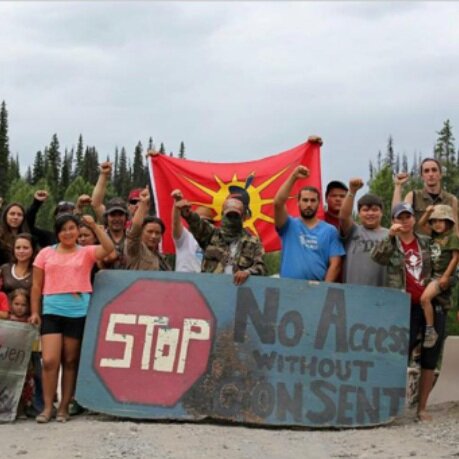ERIEL TCHEKWIE DERANGER on Solidarity with Unist'ot'en /107
Photo courtesy of Unist’ot’en Camp
This week, Eriel Tchekwie Deranger joins us in a conversation around the recent developments regarding TransCanada’s LNG Pipeline proposal on Wet’suwet’en Territory. It is our hope that this episode provides some historical context to the actions of corporations and colonizers regarding the 4.7 billion dollar pipeline project. Beyond the headlines, we think it is important to have a broad understanding of what Unist’ot’en Camp represents, the ongoing history of surveillance faced by frontline protectors, how policy is used as a tool of assimilation, and the illegality of the actions taken by Canada’s federal and provincial governments. Unist’ot’en People’s reoccupation of their traditional territories cannot solely be understood in relation to infrastructure development – it must also be understood as a means to decolonize and return to the land, to connect with culture and identity, and revitalize forms of governance that seek to truly govern and lead, not to oppress and exploit.
Eriel Tchekwie Deranger
Eriel Tchekwie Deranger is a Denesuline Indigenous activist, member of the Athabasca Chipewyan First Nation, and the Executive Director and co-founder of Indigenous Climate Action. Eriel has spent over 6 years building-up the highly successful international Indigenous Tar Sands campaign and has become widely known as one of the world’s most effective organizers and coalition builders to defend Indigenous people’s rights locally, nationally and globally.
This episode reminds us that corporate interests and colonial interests have always been deeply intertwined. Eriel articulates how narratives that surround the developments at Unist’ot’en Camp show how colonization has deeply warped our perspective on who get labeled the heroes and villains. While the state continues to prioritize the protection and expansion of infrastructure over people, we must encourage each other to see with clear vision where the true threat lies. Pipelines and policy are threatening biodiversity, both cultural and biological, across our planet. What is happening now on Wet’suwet’en/Gidumt’en territory is not an isolated incident, but rather a magnified example of what is unfolding amongst all Indigenous communities that are exercising their sovereignty, protecting the land, and taking a stand against exacerbating climate crisis and resource extraction.
Take Action
Unist’ot’en Camp is calling for solidarity action to stop any further development of pipelines on Wet’suwet’en territory. Here is a list of actions we can take to let Canadian government officials know that what is transpiring is not only immoral but illegal as well.
If you live in so-called Canada, Unist’ot’en Camp is calling for supporters to occupy the offices of Canada’s Members of the Legislative Assembly and Members of Parliament. If you live outside of the country, you can send an email to the provincial government of B.C. and the federal government expressing your outrage. For more information on whom to direct your email to and what to include, visit https://actions.sumofus.org/a/no-pipelines-through-unis-to-ten-lands
Call a key government Minister to demand that they rescind the previously approved permits, for guidelines on what to say and to learn who you will be speaking to, visit https://act.leadnow.ca/call-federal-support-wetsuweten/
Donate. By donating directly your contributions ensure that supporters on the land have medical and food supplies. You can make a one-time donation, a monthly donation, or donate directly to the Unist’ot’en Camp Legal fund by visiting http://unistoten.camp/support-us/donate/
Host a fundraiser to help support the long-term expenses of sustaining Unist’ot’en Camp. For detailed guidelines on how to organize a fundraiser to benefit Unist’ot’en Camp, visit http://unistoten.camp/fundraiserprotocols/
Further educate yourself by reading Unist’ot’en Camp’s guidelines and resources on allyship and solidarity as well as their zine “Heal the people, Heal the land” by visiting http://unistoten.camp/no-pipelines/resources/allyship/ and http://unistoten.camp/come-to-camp/healing/
To find actions and events in solidarity near you, visit https://www.facebook.com/groups/SupportWetsuweten/
If you are interested in learning more about Unist’ot’en’s “Call to Action” or physically volunteering at the camp, you can visit the following resources:
http://unistoten.camp/come-to-camp/call-to-action/
https://unistoten.camp/come-to-camp/preparing-for-your-visit/



For The Wild Podcast is an anthology of the Anthropocene; focused on land-based protection, co-liberation and intersectional storytelling rooted in a paradigm shift away from human supremacy, endless growth and consumerism.